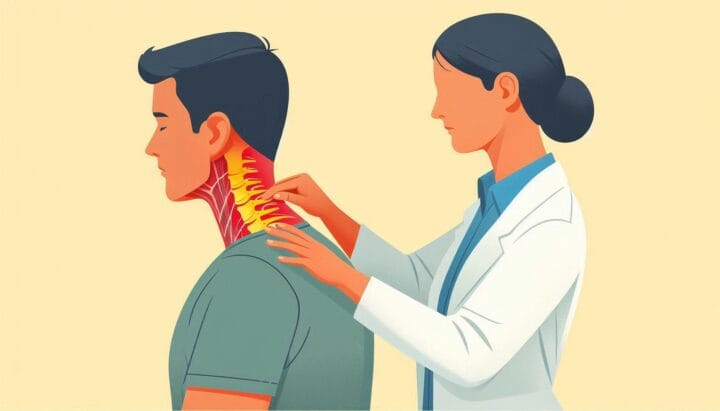Neck Pain Relief at Home: Your Guide to Comfort
Table of Contents

Neck Pain Relief at Home: Your Guide to Comfort
Meta Description: Discover effective neck pain treatments you can do at home. From stretches to lifestyle changes, find relief and prevent future discomfort.
Meta Tags: neck pain relief, home remedies for neck pain, neck stretches, posture improvement, neck pain prevention
URL Structure: neck-pain-treatment-at-home-guide
Introduction: Tackling Neck Pain Head-On
Hey there! Is your neck giving you grief? You’re not alone. Neck pain can be a real pain in the… well, neck. But here’s the good news: you don’t always need fancy treatments or doctor visits to find relief. In this guide, we’ll explore simple, effective ways to treat neck pain right in the comfort of your own home. Whether you’ve slept funny, spent too long hunched over your phone, or just feeling the stress of daily life, we’ve got you covered. Let’s dive in and get that neck of yours feeling better!
Understanding Neck Pain: What’s Really Going On?
Before we jump into treatments, let’s break down what’s happening in your neck. Think of your neck as a busy highway. When there’s a traffic jam (muscle tension, pinched nerves, or inflammation), you feel it. Common causes include:
- Poor posture (hello, tech neck!)
- Sleeping in an awkward position
- Stress and tension
- Injuries or accidents
- Age-related wear and tear
Knowing what’s causing your pain can help you target your treatment more effectively. But don’t worry, most of the remedies we’ll discuss can help regardless of the cause.
Quick Relief: Immediate Actions for Neck Pain
When neck pain strikes, you want relief fast. Here are some quick fixes you can try right away:
Ice, Ice, Baby (Or Heat, If You Prefer)
Applying ice or heat can work wonders for neck pain. Here’s how to do it right:
- Ice: Use for the first 48-72 hours after pain starts. Wrap an ice pack in a thin towel and apply for 15-20 minutes every hour.
- Heat: After the initial inflammation period, switch to heat. Use a heating pad or take a warm shower to relax those tight muscles.
Pro tip: Some people find alternating between ice and heat (10 minutes each) provides the best relief.
Gentle Stretches for Instant Relief
Simple stretches can help loosen tight muscles and improve range of motion. Try these:
- Neck Rolls: Slowly roll your head in a circle, first clockwise, then counterclockwise. Repeat 5 times each way.
- Shoulder Shrugs: Lift your shoulders towards your ears, hold for 5 seconds, then relax. Repeat 10 times.
- Side-to-Side Tilt: Gently tilt your head to one side, bringing your ear towards your shoulder. Hold for 10 seconds, then switch sides. Repeat 5 times on each side.
Remember, these stretches should feel good. If anything hurts, stop immediately.
Massage: Your Hands-On Approach to Pain Relief
A gentle self-massage can do wonders for neck pain. Here’s a quick technique:
- Use your fingertips to apply gentle pressure to the base of your skull.
- Slowly move down the sides of your neck, kneading gently.
- Work your way to your shoulders, focusing on any tight spots.
For an extra boost, try using a tennis ball or foam roller to target those hard-to-reach areas.
Long-Term Solutions: Lifestyle Changes for Lasting Relief
While quick fixes are great, preventing neck pain in the first place is even better. Let’s look at some lifestyle changes that can make a big difference:
Posture Perfect: Aligning Your Way to Comfort
Poor posture is a major culprit when it comes to neck pain. Here’s how to straighten things out:
- At Your Desk: Keep your computer screen at eye level. Your chair should support your lower back, and your feet should be flat on the floor.
- On Your Phone: Hold your phone at eye level instead of looking down. Better yet, take regular breaks from your devices.
- While Sleeping: Use a pillow that keeps your neck aligned with your spine. Side and back sleepers, this one’s especially important for you!
Stress Less: Mental Techniques for Physical Relief
Stress can cause us to tense up, especially in our neck and shoulders. Try these relaxation techniques:
- Deep Breathing: Take slow, deep breaths, focusing on relaxing your neck and shoulders as you exhale.
- Progressive Muscle Relaxation: Tense and then relax each muscle group in your body, starting from your toes and working up to your head.
- Mindfulness Meditation: Even a few minutes a day can help reduce overall tension in your body.
Move It or Lose It: Exercise for Neck Health
Regular exercise can strengthen the muscles that support your neck. Try incorporating these into your routine:
- Neck Strengthening Exercises: Gently push your head against your hand in different directions, holding for 5-10 seconds each time.
- Yoga: Poses like Cat-Cow and Child’s Pose can be great for neck flexibility.
- Swimming: The buoyancy of water can help relieve pressure on your neck while you strengthen your muscles.
Remember, start slow and listen to your body. If something hurts, stop and consult a professional.
Natural Remedies: Mother Nature’s Pain Relief
Sometimes, the best solutions come straight from nature. Here are some natural remedies that might help ease your neck pain:
Herbal Helpers: Plants That Pack a Punch
- Turmeric: This golden spice has powerful anti-inflammatory properties. Try adding it to your food or drinking turmeric tea.
- Ginger: Another anti-inflammatory powerhouse. Brew some ginger tea or add fresh ginger to your meals.
- Lavender: Known for its relaxing properties, lavender essential oil can be used in a diffuser or diluted and applied topically.
Hydration Station: The Power of Water
Staying hydrated is crucial for overall health, including neck pain prevention. Here’s why:
- Water helps keep your spinal discs hydrated, which can reduce pressure on your neck.
- Proper hydration helps flush out toxins that might contribute to inflammation.
- Aim for at least 8 glasses of water a day, more if you’re active or in a hot climate.
Sleep Tight: The Importance of Rest
Never underestimate the power of a good night’s sleep for neck pain relief. Try these tips:
- Invest in a supportive pillow that keeps your neck aligned.
- Avoid sleeping on your stomach, which can strain your neck.
- Create a relaxing bedtime routine to help you unwind and reduce tension.
When to Seek Professional Help
While home remedies can work wonders, sometimes you need a pro. Here are signs it’s time to see a doctor:
- Pain persists for more than a week despite home treatment
- You experience numbness, tingling, or weakness in your arms
- The pain is severe or gets worse over time
- You have a fever along with neck pain
- You’ve recently been in an accident or suffered an injury
Don’t hesitate to seek medical attention if you’re concerned. It’s always better to be safe than sorry when it comes to your health.
Conclusion: Your Neck, Your Health
Dealing with neck pain can be frustrating, but with these home remedies and lifestyle changes, you’re well-equipped to tackle the discomfort head-on. Remember, consistency is key. Incorporate these tips into your daily routine, and you’ll likely see (and feel) improvements over time. Your neck does a lot for you every day – it’s time to return the favor by taking good care of it. Here’s to pain-free days ahead!
FAQs: Your Neck Pain Questions Answered
- How long does it typically take for neck pain to go away with home treatment?
Most cases of minor neck pain improve within a few days to a week with proper home care. If pain persists beyond this time, consult a healthcare professional. - Can poor sleep posture really cause neck pain?
Absolutely! Sleeping in an awkward position can strain your neck muscles and lead to pain. Try to maintain a neutral spine position while sleeping and use a supportive pillow. - Is it better to use heat or ice for neck pain?
It depends on the situation. Ice is generally best for the first 48-72 hours to reduce inflammation. After that, heat can help relax muscles and improve blood flow. - How often should I do neck stretches for pain relief?
Gentle neck stretches can be done several times a day. Start with 2-3 times daily and listen to your body. If a stretch causes pain, stop immediately. - Can stress really cause physical neck pain?
Yes, stress can cause muscle tension, particularly in the neck and shoulders. Practicing stress-reduction techniques like deep breathing or meditation can help alleviate this tension.
Citations:
[1] https://southernpainclinic.com/blog/how-to-reduce-neck-pain-at-home/
[2] https://www.physiotattva.com/blog/home-remedies-to-fix-a-stiff-neck
[3] https://www.mayoclinic.org/diseases-conditions/neck-pain/diagnosis-treatment/drc-20375587
[4] https://www.advocatehealth.com/health-services/brain-spine-institute/spine-care-center/neck-pain/relief
[5] https://www.webmd.com/a-to-z-guides/remedies-for-stiff-neck
[6] https://www.healthline.com/health/how-to-get-rid-of-a-stiff-neck
[7] https://www.bodyworksmed.com/blog/3-all-natural-methods-for-treating-neck-pain
[8] https://atlasneurosurgery.com/7-treatments-for-lumbar-radiculopathy/













Post Comment